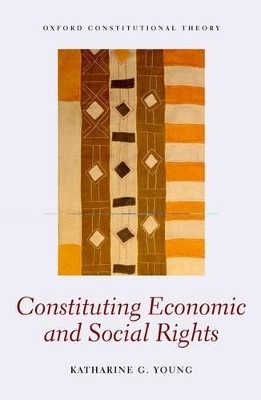
Constituting Economic and Social Rights
Oxford University Press (Verlag)
978-0-19-964193-2 (ISBN)
Food, water, health, housing, and education are as fundamental to human freedom and dignity as privacy, religion, or speech. Yet only recently have legal systems begun to secure these fundamental individual interests as rights. This book looks at the dynamic processes that render economic and social rights in legal form. It argues that processes of interpretation, enforcement, and contestation each reveal how economic and social interests can be protected as human and constitutional rights, and how their protection changes public law.
Drawing on constitutional examples from South Africa, Colombia, Ghana, India, the United Kingdom, the United States and elsewhere, the book examines innovations in the design and role of institutions such as courts, legislatures, executives, and agencies in the organization of social movements and in the links established with market actors. This comparative study shows how legal systems protect economic and social rights by shifting the focus from minimum bundles of commodities or entitlements to processes of value-based, deliberative problem solving. Theories of constitutionalism and governance inform the potential of this approach to reconcile economic and social rights with both democratic and market principles, while addressing the material inequality, poverty and social conflict caused, in part, by law itself.
Dr Katharine Young is Associate Professor at Boston College Law School. She completed doctoral studies at Harvard Law School and law and arts degrees at Melbourne Law School. Dr Young has served as a Fellow at a number of interdisciplinary programs, including Amartya Sen's Project on Justice, Welfare and Economics at Harvard University. She has comparative professional experience in Australia, the United States, and in the United Nations legal system.
1. Introduction: The Path to Transformation ; PART I: CONSTITUTING RIGHTS BY INTERPRETATION ; 2. Interpretative Standpoints ; 3. Interpreting the Minimum ; 4. Interpreting Limits ; PART II: CONSTITUTING RIGHTS BY ENFORCEMENT ; 5. A Typology of Judicial Review ; 6. The Catalytic Court ; 7. A Comparative Typology of Courts ; PART III: CONSTITUTING RIGHTS BY CONTESTATION ; 8. Social Movements and Economic and Social Rights ; 9. The Governance Function of Economic and Social Rights ; 10. Conclusion: Economic and Social Rights as Human Rights and Constitutional Rights
| Reihe/Serie | Oxford Constitutional Theory |
|---|---|
| Verlagsort | Oxford |
| Sprache | englisch |
| Maße | 163 x 240 mm |
| Gewicht | 710 g |
| Themenwelt | Recht / Steuern ► EU / Internationales Recht |
| Recht / Steuern ► Öffentliches Recht ► Völkerrecht | |
| Sozialwissenschaften ► Politik / Verwaltung ► Staat / Verwaltung | |
| ISBN-10 | 0-19-964193-5 / 0199641935 |
| ISBN-13 | 978-0-19-964193-2 / 9780199641932 |
| Zustand | Neuware |
| Haben Sie eine Frage zum Produkt? |
aus dem Bereich


